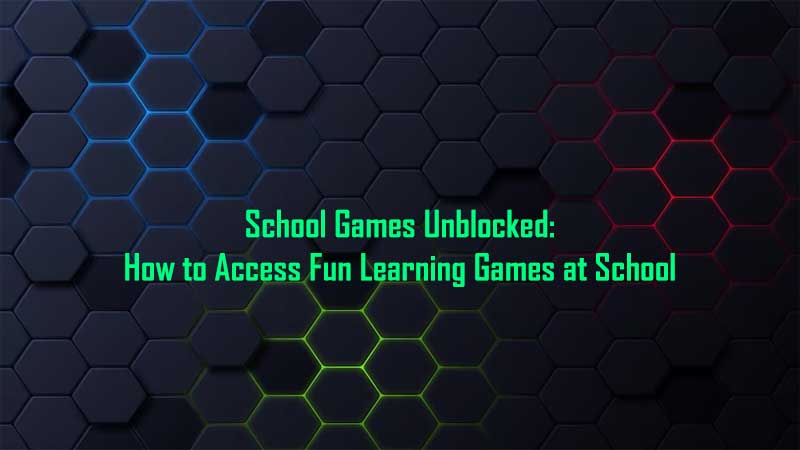Going to school can be tough for kids. Between classes, homework and tests, it’s easy to get bored and restless. However, many schools now allow access to unblocked games as a way to make learning more engaging and fun.
Unblocked games are interactive, educational games that students can play even if the school has put filters on their internet access. These games allow kids to take a break, stimulate their minds and reinforce skills in core subjects like math, reading and science.
In this article, we’ll explore the benefits of school Unblocked games freezenova, how to access them at school, and some of the best options to try.
Why Play Unblocked Games at School?
There are many advantages to allowing students to play unblocked games during free time or even in the classroom. Here are some of the top benefits:
1. Makes Learning More Engaging
Educational games present learning objectives in interactive and competitive formats. This increases student engagement and motivation to learn.
2. Reinforces Subject Knowledge
Games focused on topics like math, vocabulary or science help reinforce concepts learned in class. This improves knowledge retention for students.
3. Improves Computer Literacy
Playing digital games develops kids’ familiarity with computers and technology. This is an important skill for today’s tech-driven world.
4. Allows Brain Breaks
Games provide mental breaks between intense learning blocks. This gives brains a chance to refresh and helps kids focus better.
5. Develops Logic and Critical Thinking
Puzzles, strategy games and trivia challenges build critical thinking abilities. Kids learn to apply logic to solve problems.
6. Practices Motor Skills
Games that require dragging, clicking and keyboard use help develop mouse and typing skills. These improve hand-eye coordination.
7. Teaches Time Management
Many games challenge players to finish objectives within a set time limit. This teaches effective time management.
How to Access Unblocked Games at School
School IT administrators can choose to unblock access to game websites and enable flash games or downloads from app stores. However, policies vary between schools. Here are some tips for students to access games:
Use School Computers
The school’s computer lab desktops may allow access to pre-approved games if teachers request this. Public school libraries also often have games available.
Try Mobile Games
School wifi networks may allow students to play unblocked games on mobile devices during free periods. Popular mobile options include puzzles, arcade games and trivia apps.
Use VPNs
Virtual private networks (VPNs) can get around school firewalls by masking device IP addresses. Students can try connecting through VPNs to access blocked game sites.
Play Offline Games
Students can play offline games stored on school devices or bring their own games on USB drives. These will work even if the network blocks gaming sites.
Request Access
Students can petition teachers and school IT to unblock specific game URLs that support education. Approval isn’t guaranteed but it’s worth asking!
While most schools allow some games, policies differ on what access students have. The options above give a starting point to help students find available unblocked games.
10 Best Unblocked Games for School
Schools tend to favor allowing games that are free, advertisement-free and reinforce curricular concepts. Here are 10 of the top picks in various categories:
Math Games
- Prodigy – Battles math monsters in a Pokemon-style adventure that covers core math skills. Adaptive questions keep students challenged at their own level.
- Math Playground – Arcade-style games let students practice math skills like multiplication and fractions in fun formats like racing games and robot battles.
Typing Games
- TypeTastic – Typing games structured in missions with boss battles increase typing speed and accuracy through challenges tailored to skill level.
- Typing Chef – Rhythm-based typing games have players chop ingredients, decorate cakes and run restaurants through typing speed. Great for building muscle memory.
Educational Trivia
- Quizlet – Create flashcards and play multiple quiz game formats to master any school subject vocabulary. Competition keeps trivia practice engaging.
- Kahoot – Answer trivia questions on any topic in a live gameshow format competing against classmates. Great for exam prep and review.
Word Games
- Wordsandmagic – Combine letters into words to defeat monsters in this educational spin on Scrabble gameplay. Vocabulary-building in RPG format.
- Freerice – Improve vocabulary by answering multiple-choice questions. For each right answer, the site donates rice to charity, making learning more meaningful.
Problem-Solving
- Dragon Box Algebra – Solve visual algebra puzzles with cute dragons that first introduce concepts intuitively without formulas or symbols.
- Blockly Games – Write code by snapping together visual blocks to guide characters through puzzles. Develops coding logic and problem-solving skills.
This selection shows the diversity of games available in all core subjects that offer learning through engaging gameplay mechanics. While every school’s unblocked games list varies, these highly-rated titles are great ones to request access to. Their educational value and enthusiasm from students make them more likely to get approval.
4 Tips for Teachers to Use Unblocked Games
Teachers play an important role in ensuring games get used effectively in the classroom. Here are some top tips:
1. Set Educational Goals
Have clear learning objectives like practicing computations or spelling vocabulary when using a game for instruction. Share these goals with students so they stay focused.
2. Choose Age-Appropriate Games
Vet games beforehand to ensure the difficulty and content suit grade level abilities. Review educational game portals made specifically for your students’ age.
3. Set Time Limits
Use a timer to keep gameplay sessions short and targeted. For example, 15 minutes to reinforce the day’s math lesson. Don’t let games eat up entire classes.
4. Pair with Discussion
After gameplay, debrief skills learned and connect gameplay elements back to the curriculum. Reflection cements instructional value.
Following these tips will keep gameplay productive. Teachers should also monitor student progress and rotate games to cover different skill areas.
Frequently Asked Questions About School Games Unblocked
Here are answers to some common questions students and teachers have about accessing games in school:
Are all unblocked games educational?
Not necessarily. Schools sometimes allow games purely for entertainment too. However, most limit access to games that support learning to keep gameplay productive.
Can teachers get in trouble for using unblocked games?
Teachers likely won’t get in trouble as long as the games clearly tie to curricular objectives and gameplay time doesn’t excessive. Getting administrator approval first is best.
Are there risks to playing unblocked games?
There are minor risks like computer viruses and exposure to advertising. Schools mitigate this by limiting which game sites can be accessed. Overall, good unblocked games from reputable developers tend to be safe.
Can games be played during class time?
This depends on school policy. Some only allow games during free periods or after finishing work early. Others grant teachers discretion to use games for short periods during class for breaks or reinforcing lessons.
Will unblocked games eventually get blocked?
School IT departments regularly review which sites are allowed and may change their whitelist. A once-allowed game site could get blocked in the future if policies get updated or the content raises concerns.
While rules vary between schools, unblocked games are becoming more commonly accepted for their educational benefits. Following responsible gaming practices will help ensure students can keep accessing the learning opportunities games provide.
The Benefits of Safely Designed Unblocked Games
School games unblocked provide a multitude of benefits to students when used purposefully. They allow kids to:
- Practice core skills in reading, writing, math, science and more in interactive ways
- Stimulate their minds with brain break challenges between lessons
- Learn digital literacy and computer skills critical for the modern workplace
- Develop logic, critical analysis and problem solving by overcoming gameplay obstacles
- Train time management and mental focus by playing within defined time periods
Games also provide variety from traditional pen-and-paper drills, helping re-engage reluctant learners. Taking advantage of these learning opportunities starts with getting access to great games designed for educational impact.
While each school’s unblocked game policies vary, students and teachers should advocate for access to responsible games that clearly support curriculum. With the right approach, playing games at school can unlock key skills for future life success.




